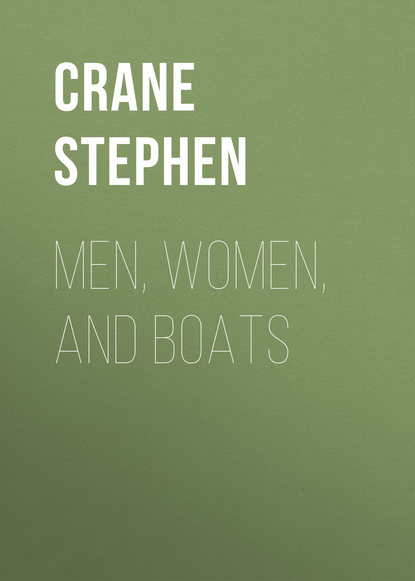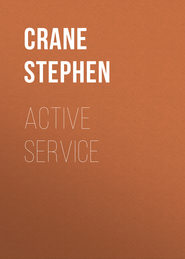По всем вопросам обращайтесь на: info@litportal.ru
(©) 2003-2025.
✖
Men, Women, and Boats
Автор
Год написания книги
2018
Настройки чтения
Размер шрифта
Высота строк
Поля
The correspondent remained in the grip of this strange new enemy—a current. The shore, with its white slope of sand and its green bluff, topped with little silent cottages, was spread like a picture before him. It was very near to him then, but he was impressed as one who in a gallery looks at a scene from Brittany or Holland.
He thought: "I am going to drown? Can it be possible Can it be possible? Can it be possible?" Perhaps an individual must consider his own death to be the final phenomenon of nature.
But later a wave perhaps whirled him out of this small, deadly current, for he found suddenly that he could again make progress toward the shore. Later still, he was aware that the captain, clinging with one hand to the keel of the dingey, had his face turned away from the shore and toward him, and was calling his name. "Come to the boat! Come to the boat!"
In his struggle to reach the captain and the boat, he reflected that when one gets properly wearied, drowning must really be a comfortable arrangement, a cessation of hostilities accompanied by a large degree of relief, and he was glad of it, for the main thing in his mind for some months had been horror of the temporary agony. He did not wish to be hurt.
Presently he saw a man running along the shore. He was undressing with most remarkable speed. Coat, trousers, shirt, everything flew magically off him.
"Come to the boat," called the captain.
"All right, captain." As the correspondent paddled, he saw the captain let himself down to bottom and leave the boat. Then the correspondent performed his one little marvel of the voyage. A large wave caught him and flung him with ease and supreme speed completely over the boat and far beyond it. It struck him even then as an event in gymnastics, and a true miracle of the sea. An over-turned boat in the surf is not a plaything to a swimming man.
The correspondent arrived in water that reached only to his waist, but his condition did not enable him to stand for more than a moment. Each wave knocked him into a heap, and the under-tow pulled at him.
Then he saw the man who had been running and undressing, and undressing and running, come bounding into the water. He dragged ashore the cook, and then waded towards the captain, but the captain waved him away, and sent him to the correspondent. He was naked, naked as a tree in winter, but a halo was about his head, and he shone like a saint. He gave a strong pull, and a long drag, and a bully heave at the correspondent's hand. The correspondent, schooled in the minor formulae, said: "Thanks, old man." But suddenly the man cried: "What's that?" He pointed a swift finger. The correspondent said: "Go."
In the shallows, face downward, lay the oiler. His forehead touched sand that was periodically, between each wave, clear of the sea.
The correspondent did not know all that transpired afterward. When he achieved safe ground he fell, striking the sand with each particular part of his body. It was as if he had dropped from a roof, but the thud was grateful to him.
It seems that instantly the beach was populated with men with blankets, clothes, and flasks, and women with coffeepots and all the remedies sacred to their minds. The welcome of the land to the men from the sea was warm and generous, but a still and dripping shape was carried slowly up the beach, and the land's welcome for it could only be the different and sinister hospitality of the grave.
When it came night, the white waves paced to and fro in the moonlight, and the wind brought the sound of the great sea's voice to the men on shore, and they felt that they could then be interpreters.
THE RELUCTANT VOYAGERS
CHAPTER I
Two men sat by the sea waves.
"Well, I know I'm not handsome," said one gloomily. He was poking holes in the sand with a discontented cane.
The companion was watching the waves play. He seemed overcome with perspiring discomfort as a man who is resolved to set another man right.
Suddenly his mouth turned into a straight line.
"To be sure you are not," he cried vehemently.
"You look like thunder. I do not desire to be unpleasant, but I must assure you that your freckled skin continually reminds spectators of white wall paper with gilt roses on it. The top of your head looks like a little wooden plate. And your figure—heavens!"
For a time they were silent. They stared at the waves that purred near their feet like sleepy sea-kittens.
Finally the first man spoke.
"Well," said he, defiantly, "what of it?"
"What of it?" exploded the other. "Why, it means that you'd look like blazes in a bathing-suit."
They were again silent. The freckled man seemed ashamed. His tall companion glowered at the scenery.
"I am decided," said the freckled man suddenly. He got boldly up from the sand and strode away. The tall man followed, walking sarcastically and glaring down at the round, resolute figure before him.
A bath-clerk was looking at the world with superior eyes through a hole in a board. To him the freckled man made application, waving his hands over his person in illustration of a snug fit. The bath-clerk thought profoundly. Eventually, he handed out a blue bundle with an air of having phenomenally solved the freckled man's dimensions.
The latter resumed his resolute stride.
"See here," said the tall man, following him, "I bet you've got a regular toga, you know. That fellow couldn't tell—"
"Yes, he could," interrupted the freckled man, "I saw correct mathematics in his eyes."
"Well, supposin' he has missed your size. Supposin'—"
"Tom," again interrupted the other, "produce your proud clothes and we'll go in."
The tall man swore bitterly. He went to one of a row of little wooden boxes and shut himself in it. His companion repaired to a similar box.
At first he felt like an opulent monk in a too-small cell, and he turned round two or three times to see if he could. He arrived finally into his bathing-dress. Immediately he dropped gasping upon a three-cornered bench. The suit fell in folds about his reclining form. There was silence, save for the caressing calls of the waves without.
Then he heard two shoes drop on the floor in one of the little coops.
He began to clamor at the boards like a penitent at an unforgiving door.
"Tom," called he, "Tom—"
A voice of wrath, muffled by cloth, came through the walls. "You go t' blazes!"
The freckled man began to groan, taking the occupants of the entire row of coops into his confidence.
"Stop your noise," angrily cried the tall man from his hidden den. "You rented the bathing-suit, didn't you? Then—"
"It ain't a bathing-suit," shouted the freckled man at the boards.
"It's an auditorium, a ballroom, or something. It isn't a bathing-suit."
The tall man came out of his box. His suit looked like blue skin. He walked with grandeur down the alley between the rows of coops. Stopping in front of his friend's door, he rapped on it with passionate knuckles.
"Come out of there, y' ol' fool," said he, in an enraged whisper. "It's only your accursed vanity. Wear it anyhow. What difference does it make? I never saw such a vain ol' idiot!"
As he was storming the door opened, and his friend confronted him. The tall man's legs gave way, and he fell against the opposite door.
The freckled man regarded him sternly.
"You're an ass," he said.
His back curved in scorn. He walked majestically down the alley. There was pride in the way his chubby feet patted the boards. The tall man followed, weakly, his eyes riveted upon the figure ahead.
As a disguise the freckled man had adopted the stomach of importance. He moved with an air of some sort of procession, across a board walk, down some steps, and out upon the sand.
He thought: "I am going to drown? Can it be possible Can it be possible? Can it be possible?" Perhaps an individual must consider his own death to be the final phenomenon of nature.
But later a wave perhaps whirled him out of this small, deadly current, for he found suddenly that he could again make progress toward the shore. Later still, he was aware that the captain, clinging with one hand to the keel of the dingey, had his face turned away from the shore and toward him, and was calling his name. "Come to the boat! Come to the boat!"
In his struggle to reach the captain and the boat, he reflected that when one gets properly wearied, drowning must really be a comfortable arrangement, a cessation of hostilities accompanied by a large degree of relief, and he was glad of it, for the main thing in his mind for some months had been horror of the temporary agony. He did not wish to be hurt.
Presently he saw a man running along the shore. He was undressing with most remarkable speed. Coat, trousers, shirt, everything flew magically off him.
"Come to the boat," called the captain.
"All right, captain." As the correspondent paddled, he saw the captain let himself down to bottom and leave the boat. Then the correspondent performed his one little marvel of the voyage. A large wave caught him and flung him with ease and supreme speed completely over the boat and far beyond it. It struck him even then as an event in gymnastics, and a true miracle of the sea. An over-turned boat in the surf is not a plaything to a swimming man.
The correspondent arrived in water that reached only to his waist, but his condition did not enable him to stand for more than a moment. Each wave knocked him into a heap, and the under-tow pulled at him.
Then he saw the man who had been running and undressing, and undressing and running, come bounding into the water. He dragged ashore the cook, and then waded towards the captain, but the captain waved him away, and sent him to the correspondent. He was naked, naked as a tree in winter, but a halo was about his head, and he shone like a saint. He gave a strong pull, and a long drag, and a bully heave at the correspondent's hand. The correspondent, schooled in the minor formulae, said: "Thanks, old man." But suddenly the man cried: "What's that?" He pointed a swift finger. The correspondent said: "Go."
In the shallows, face downward, lay the oiler. His forehead touched sand that was periodically, between each wave, clear of the sea.
The correspondent did not know all that transpired afterward. When he achieved safe ground he fell, striking the sand with each particular part of his body. It was as if he had dropped from a roof, but the thud was grateful to him.
It seems that instantly the beach was populated with men with blankets, clothes, and flasks, and women with coffeepots and all the remedies sacred to their minds. The welcome of the land to the men from the sea was warm and generous, but a still and dripping shape was carried slowly up the beach, and the land's welcome for it could only be the different and sinister hospitality of the grave.
When it came night, the white waves paced to and fro in the moonlight, and the wind brought the sound of the great sea's voice to the men on shore, and they felt that they could then be interpreters.
THE RELUCTANT VOYAGERS
CHAPTER I
Two men sat by the sea waves.
"Well, I know I'm not handsome," said one gloomily. He was poking holes in the sand with a discontented cane.
The companion was watching the waves play. He seemed overcome with perspiring discomfort as a man who is resolved to set another man right.
Suddenly his mouth turned into a straight line.
"To be sure you are not," he cried vehemently.
"You look like thunder. I do not desire to be unpleasant, but I must assure you that your freckled skin continually reminds spectators of white wall paper with gilt roses on it. The top of your head looks like a little wooden plate. And your figure—heavens!"
For a time they were silent. They stared at the waves that purred near their feet like sleepy sea-kittens.
Finally the first man spoke.
"Well," said he, defiantly, "what of it?"
"What of it?" exploded the other. "Why, it means that you'd look like blazes in a bathing-suit."
They were again silent. The freckled man seemed ashamed. His tall companion glowered at the scenery.
"I am decided," said the freckled man suddenly. He got boldly up from the sand and strode away. The tall man followed, walking sarcastically and glaring down at the round, resolute figure before him.
A bath-clerk was looking at the world with superior eyes through a hole in a board. To him the freckled man made application, waving his hands over his person in illustration of a snug fit. The bath-clerk thought profoundly. Eventually, he handed out a blue bundle with an air of having phenomenally solved the freckled man's dimensions.
The latter resumed his resolute stride.
"See here," said the tall man, following him, "I bet you've got a regular toga, you know. That fellow couldn't tell—"
"Yes, he could," interrupted the freckled man, "I saw correct mathematics in his eyes."
"Well, supposin' he has missed your size. Supposin'—"
"Tom," again interrupted the other, "produce your proud clothes and we'll go in."
The tall man swore bitterly. He went to one of a row of little wooden boxes and shut himself in it. His companion repaired to a similar box.
At first he felt like an opulent monk in a too-small cell, and he turned round two or three times to see if he could. He arrived finally into his bathing-dress. Immediately he dropped gasping upon a three-cornered bench. The suit fell in folds about his reclining form. There was silence, save for the caressing calls of the waves without.
Then he heard two shoes drop on the floor in one of the little coops.
He began to clamor at the boards like a penitent at an unforgiving door.
"Tom," called he, "Tom—"
A voice of wrath, muffled by cloth, came through the walls. "You go t' blazes!"
The freckled man began to groan, taking the occupants of the entire row of coops into his confidence.
"Stop your noise," angrily cried the tall man from his hidden den. "You rented the bathing-suit, didn't you? Then—"
"It ain't a bathing-suit," shouted the freckled man at the boards.
"It's an auditorium, a ballroom, or something. It isn't a bathing-suit."
The tall man came out of his box. His suit looked like blue skin. He walked with grandeur down the alley between the rows of coops. Stopping in front of his friend's door, he rapped on it with passionate knuckles.
"Come out of there, y' ol' fool," said he, in an enraged whisper. "It's only your accursed vanity. Wear it anyhow. What difference does it make? I never saw such a vain ol' idiot!"
As he was storming the door opened, and his friend confronted him. The tall man's legs gave way, and he fell against the opposite door.
The freckled man regarded him sternly.
"You're an ass," he said.
His back curved in scorn. He walked majestically down the alley. There was pride in the way his chubby feet patted the boards. The tall man followed, weakly, his eyes riveted upon the figure ahead.
As a disguise the freckled man had adopted the stomach of importance. He moved with an air of some sort of procession, across a board walk, down some steps, and out upon the sand.












